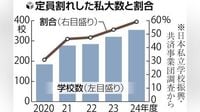In a significant development for higher education in Kyoto, the school corporation Notre Dame Women's College announced on April 22, 2025, that it will cease student recruitment for Kyoto Notre Dame Women's University starting from the 2026 academic year. This decision comes as a response to a series of challenges faced by the institution, particularly the rapid decline in the 18-year-old population in Japan, which has severely impacted enrollment numbers.
According to the university's announcement, the board of directors made this "difficult decision" after recognizing that the number of applicants has consistently fallen below the university's quota in recent years. The institution stated, "We have pursued various measures to ensure the university's survival, but we have no choice but to stop recruitment after the 2025 academic year." This means that the last cohort of students admitted in the spring of 2025 will be the final group to graduate, marking the end of an era for the university.
Founded in 1961 by the Notre Dame Education Missionary Society, Kyoto Notre Dame Women's University has long been recognized for its commitment to women’s education, promoting the ideals of "virtue and knowledge". The university has established itself as the "Notre Dame of English", offering a robust English education alongside international programs rooted in Catholic values. It has also been at the forefront of IT education, adapting to technological advancements since the early 1990s, and has developed a life career education program for women, contributing to the professional success of its graduates.
Despite the impending closure of the university, the school corporation has assured that it will continue to provide quality education until all current students graduate. "We will work together to ensure a fulfilling student life and provide adequate support for employment and career paths," the university stated. This commitment reflects the institution's dedication to its students even in the face of such a challenging transition.
As of May 2024, the university had 881 undergraduate and 26 graduate students enrolled, but it has struggled with enrollment numbers since the 2021 academic year. The capacity for new students was set at 330 per year, yet the number of entrants has steadily declined, with only 186 students enrolling in 2024. This trend highlights the broader issue of declining birth rates and demographic shifts impacting educational institutions across Japan.
In addition to the university's closure, the announcement has implications for the affiliated educational institutions. The Notre Dame Women's College Junior and Senior High School and Notre Dame Gakuin Elementary School will continue their operations unaffected by the university's decision. This continuity ensures that the educational mission of the Notre Dame community remains intact, fostering the values and principles that have guided the institution since its inception.
The decision to close Kyoto Notre Dame Women's University marks a significant moment in the landscape of higher education in Kyoto Prefecture. It is expected to be the first closure of a four-year university in the area, raising concerns about the future of similar institutions facing enrollment challenges. As universities grapple with the realities of a declining youth population, many are forced to reevaluate their strategies and missions to remain viable.
In the wake of this announcement, the university plans to hold information sessions for students and parents starting in late April 2025. These sessions aim to provide clarity and support during this transitional period, as affected students navigate their academic futures.
The impact of this closure extends beyond the immediate academic community. Graduates of Kyoto Notre Dame Women's University have made significant contributions in various fields, embodying the institution's commitment to addressing societal challenges and promoting global engagement. The loss of the university will undoubtedly be felt by many, particularly those who have benefited from its educational programs and community.
As Japan continues to confront the realities of demographic shifts and declining birth rates, the closure of Kyoto Notre Dame Women's University serves as a poignant reminder of the challenges facing educational institutions. The university's legacy of fostering women's education and empowerment will remain, as it has produced generations of graduates who have gone on to make a difference in their communities and beyond.
In summary, while the decision to halt student recruitment and close the university is a difficult one, it reflects the changing landscape of higher education in Japan. The commitment to providing quality education until the last students graduate underscores the university's dedication to its mission and values, even as it faces an uncertain future.


